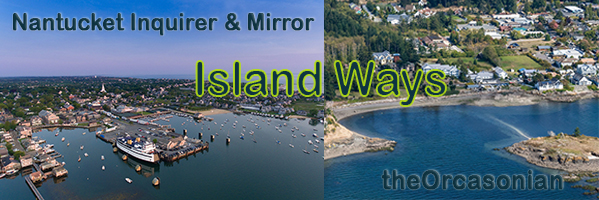||| FROM THE NANTUCKET INQUIRER & MIRROR |||
Orcas and Nantucket Islands are each roughly the same size and the same distance off their respective coasts. We share the same concerns about the high cost of living, lack of affordable housing, tourist management, ferry problems and environmental degradation. We are living on opposite ends of the country but many of the issues and opportunities are the same. Recently theOrcasonian and the Nantucket Inquirer and Mirror decided to share articles of mutual interest with our readers.
(Nov. 21, 2024) The Select Board heard loud and clear Tuesday night, the public wants it to do whatever it can to stop or delay the permitting process for current and future offshore wind farms.
That was the sentiment of the vast majority of people who attended and spoke at the board’s forum on SouthCoast Wind, an offshore energy project close to receiving federal approval to build 147 turbines 23 miles southwest of the island.
But it’s not that simple, according to the Select Board and the town’s legal counsel Cultural Heritage Partners. They claim, given the way the federal permitting system is set up, the island can only apply for mitigation measures from the Bureau of Ocean Energy Management, the federal agency in charge of permitting offshore wind farms.
The town provided a “decision tree” that laid out the choices the island has and what the results would be.
They included walking away from mitigation discussions now, which town officials say will leave Nantucket with the meager offer that BOEM has currently put on the table: $150,000 and a historic property survey nobody asked for.
“One hundred fifty thousand is a joke,” Ellen Ray said. “The night sky is already ruined with all the red blinking lights. BOEM just seems to want to shove this through.”
The other option the town has is to request greater compensation and mitigation. Some of the proposals Tuesday included setting up a response fund to be used for decommissioning and blade failures, pay for a baseline health screening of residents, move the turbines further away from the island and ask for greater monetary compensation.
But a number of people who spoke said no amount of mitigation could make up for the impact the turbines have and will have on the island.
If BOEM rejected a request for additional compensation, the town could challenge the denial in court.
There is also already precedent, the town and CHP say, for allowing wind farms to proceed on schedule while permitting appeals play out in the court.
“It sounds like you’re saying we just have to suck it up and get some mitigation. I don’t see how any of our comments are going to be heard, it’s so late in the process, I feel like this is lip service,” said Val Oliver of the local opposition group ACK for Whales.
Oliver was referring to the fact that the permitting schedule laid out for BOEM has the mitigation portion wrapping up in December.
All of this comes against the backdrop of what is expected to be a major policy shift regarding offshore wind with the incoming Trump administration replacing the Biden administration, which had made offshore wind a core tenet of its energy policy.
Trump has said that he would end offshore wind “on day one” of his second term.
“There may be a window (to stop offshore wind development) because there was a major administration change federally,” Select Board member Dawn Holdgate said. “But we are part of Massachusetts. Our governor very highly supports wind energy.”
But Mohr said that because BOEM’s cultural heritage permitting process concludes in December before any administration change, that’s not something that the town could bank on.
The Select Board said it would take all the comments under advisement and issue a public response to BOEM “in the next few days.”
**If you are reading theOrcasonian for free, thank your fellow islanders. If you would like to support theOrcasonian CLICK HERE to set your modestly-priced, voluntary subscription. Otherwise, no worries; we’re happy to share with you.**








Lin, What a great idea to share info on the many similar issues which face Orcas/San Juans and Nantucket. Thank you so much for making the connection. Not every article will be relevant, but there are so many issues that confront our communities that this is a valuable asset. Thank you.
Thank you Lin, and this article is very relevant for WA and SJC as WA state is pushing hard ahead with offshore wind energy proposed for the Pacific Coast (and the workforce and industry to supply them), and OPALCO is pushing hard ahead with offshore tidal turbines. We have a lot to learn from the East Coast communities as we fight to protect marine environments.
You can learn more about offshore wind and tidal energy projects at https://protectthecoastpnw.org.
NIMBY-ism and hypocrisy is alive and well on these island enclaves of wealth and privilege. Boohoo that they might have to look at red lights at night. Perhaps they are happier that Three Mile Island is firing back up? Never mind the communities that get to deal with uranium mining and processing! Or how about wherever the radioactive waste gets stored? Perhaps they would prefer a coal burning power plant in the middle of the island so they can fly back and forth from the City in their electric AI operated drone? The hypocrisy is nauseating.
Ken, are you not aware of the failed blade scandal? 60 tons of plastic, foam, and fiberglass fell into the ocean and has been disintegrating and fouling New England beaches since then. And a scandal about lack of oversight at the plant that makes the blades (meaning many of the blades likely have defects) has broken open since then. Are you not aware of the sharp increase in dolphin and whale strandings since the wind energy companies began seismic testing and pile driving for these machines? Are you not aware that thousands of these machines will be placed exactly along the endangered northern right whale feeding, breeding, and migration grounds and along critical bird migration routes? (with only 350 northern right whales left alive in the world).
It’s far more than just “red lights at night”. Perhaps you could spend some more time learning about these issues.
Also, I’m a proud NIMBY. This is not something to be ashamed of. It is NIMBYs who protect the environment. More than NIMBY, I’m a proud NOPE – Not On Planet Earth.
Elisabeth, I like your new avatar. Idaho sage grouse?
How do you get a custom avatar? The last one I was “assigned” looked like Barney the dinosaur crossed with a Minion.
I think I would pick the Northern Barred Owl, a cool bird well adapted to NW forests. Unfortunately, the entire NBO population of 0.5 million birds has been targeted for avicide by USF&W.gov.
This is an absurd example of species chauvinism. Grim faceless bureaucrats intend to spend millions to dispatch hunters into NW forests to exterminate NBOs in favor of the less successful Northern Spotted Owl. Succession in species is how all biomes evolve.
DOGE cannot come soon enough.
Scott, It’s a Nevada sage grouse. It’s been that for a while – I set it on Gravatar a few years ago (https://gravatar.com/) – lots of sites use that as an avatar source. It’s a painting of a sage grouse I did after seeing some sage grouse mating rituals in April (in the snow!) in Northern Nevada, in habitat that is currently being completely destroyed for a lithium mine. I’m glad I got to see the sage grouse, but it makes me sad to think of them, now dead or homeless.
I agree that the avicide of the barred owls is horrific. If we hadn’t destroyed most of the spotted owl’s habitat over the past few decades, I wonder if we’d be in this situation. But of course we’ll never know.
We are willing to make changes in everything but ourselves. The result is a battle of NIMBYs, the ultimate decision being perhaps biologically, aesthetically, and/or politically based but always involving financial as well as environmental cost. Each NIMBY has a reason, often perfectly good, for something not to happen, the cost of not doing it possibly being worse. Its easy to peck from the sidelines, but solutions, all imperfect, are hard to come up with and harder to implement. Focusing on any one element ignores other elements perhaps less empathically connectable to humans. Everything we do is costly to some aspect of nature. Even the saints among us tend not to consider their cars (of any type) or the full life cycle costs of what they own, use or consume.
We can only seek to minimize our overall damage and somehow, some day, compensate nature for our overuse.
Bill, I don’t think we can ever “compensate” nature for our overuse (i.e. ecological overshoot). We are annihilating species and the ecosystems they depend on that embody unique adaptations and symbiotic relationships that took millions or billions of years to develop. Once they are lost, they are gone for good. Any recovery that might occur would be on a timescale far beyond human comprehension.
Saying that “somehow, some day” we can “compensate nature” abdicates responsibility for our role as destroyers of the biosphere, here and now. What is required is active, intentional intervention to stop destroying the living planet, here and now.
There are no solutions other than less. A whole lot less. And I completely agree that this will be difficult if not impossible to implement, because that’s not what most people want to hear, much less do.
I also agree that we can’t focus on one element, but must rather see the big picture. It’s why I advocate for less of everything rather than argue for nuclear over wind turbines, or tidal over coal, or dams over oil. It’s all bad. We need a lot less of all of it, for far fewer people, consuming a whole lot less stuff. And again, that’s not what people want to hear or do.
Choosing between multiple bad options, we still end up with a bad option.
The answer is less. If only we could all talk about it without losing our minds! haha.
DOGE, Trump, Graham, Schumer, democrats or republicans… we’ve already lost our minds.
We need more people on the planet and more nuclear energy to provide the power for them to thrive on our planet.
Three-mile Island starting back up is a good first step. Nuclear Energy has less negative impact on our population and the environment than any viable “green” energy source today.
Let’s optimize for people, efficiency, health, and the environment. MAG/HA!
Elizabeth, I agree that compensation is not a cure in the sense that it won’t bring the past back. What we’ve lost is irrevocably lost. I meant compensation to reduce/eliminate human-made pollution including run-off into streams, loss of topsoil, not only CO2 and the like of SOx reduction. This will cost a lot, and must be built into cost and legal structures that economists don’t recognize beyond characterizing our damage as “externalization” which lowers the price of goods and raises the price of life.
I don’t think nuclear is economically feasible in the long run, or even, for the mini-nukes, the short run, without federalization of a lot of the costs and risks. Of course, this also kicks the pollution can down the road, way down, which is consistent with short-term problem solving. Spend today’s money on today, tomorrow’s on tomorrow.
I also agree that “less” is a valid and constructive solution, but we’re in a “more is more” society, and even if we throttled back, there is a far larger percentage of the world’s population seeking to catch up to where we are now. And who are we to deny them their turn?
So yes, I have found no other solution than to seek to remedy the continuing cause of mischief knowing full well that except in our memories, the past cannot be captured. But a good future for all is still possible.